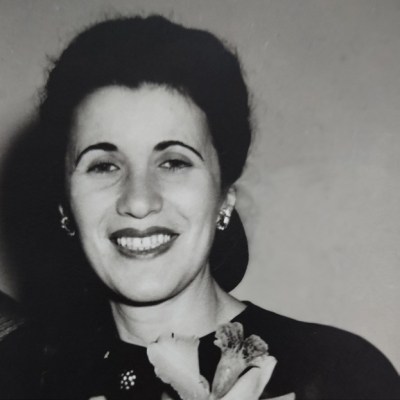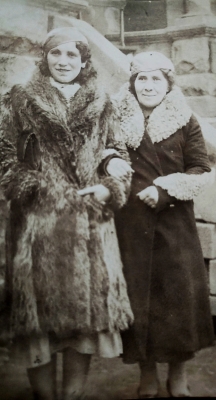Becoming Jeannette
In Poland, where she was born, they called her Josepha, or maybe Josephine, for she was named after a brother, Joseph, who had died before she came along. According to Jewish law you didn't name a child after someone who is living; a tradition, started by Ashkenazi Jews, to honor the deceased, to carry on the name.
But the "Jeannette" thing didn't happen right after she got off the boat in America. Actually, no one remembers exactly how this teenage girl, my mother, got this glamorous name. Everyone has a different story about it.
Maybe the Immigration people saw a word scrawled on the back of her visa that said "Jospa" which was no doubt a misspelling or a Yiddish nickname for Josepha. But the authorities decided she would be admitted officially as "Joseph" of all things!
So, at the immigration desk, the skinny, black-haired, wide-eyed girl, now called "Joseph," stood close to her mother, brother and sister. All of them in woolly, drab clothes. Hungry, too, because they were too scared to eat most of the obviously unkosher food on the boat.
Funny, but many moons later, this woman-child would be a person whose origins and dreams I never thought that much about. Maybe I'd listen to an entertaining story at the kitchen table on a rainy night. But after she was gone from this world, and I grew older, I became hungry for her total story. And I am just beginning.
She rarely went farther from her Polish village of Pietkowo to the town of Lapi, about five miles north, and never to the larger Bialystok. The first and last time she was in Warsaw was for the visa that would allow the difficult journey to begin. Up to the Baltic, on to England, and then to a 520-foot Scottish vessel that would take them across an ocean.
Later, in America, she would never let go of the belief that Europe meant lush green hills, forests, wooden sidewalks, and muddy roads. America, by contrast, meant tall buildings, traffic, noise and pollution. Yes, it was the land of milk and honey, but it just wasn't the "country" environment like Europe, she always said.
I think that it was a teacher in the night school where she diligently tried to master English, who convinced her that Josephine, or Jospa, just wasn't who my mom really was. That's my take on it.
I heard that from about that time, she suddenly became "Jeannette". And it wouldn't be long before the bushy black eyebrows became pencil-thin, the skirts shortened, and the hair shaped into the latest style.
She wanted to be an American girl.
But I remember how, for most of her life, she couldn't stop comparing Europe's environment to here.
Back then, as a young immigrant, she didn't yet know about the fear and revulsion many Americans felt toward Jews. She didn't suspect that even before she'd left Poland and the beautiful Narew Valley behind, America had already started to pass laws limiting immigration. And, that shortly after they'd left, the path to the Baltic had been closed.
She wasn't scared: she just wanted a new life.
But the odds of her getting here at all had been dangerously slim. And the odds of my being born here, or anywhere, had been just as slim.
If I have great-grandchildren someday, I really hope that one of the girls will be named Jeannette. To carry on the name.









Comments